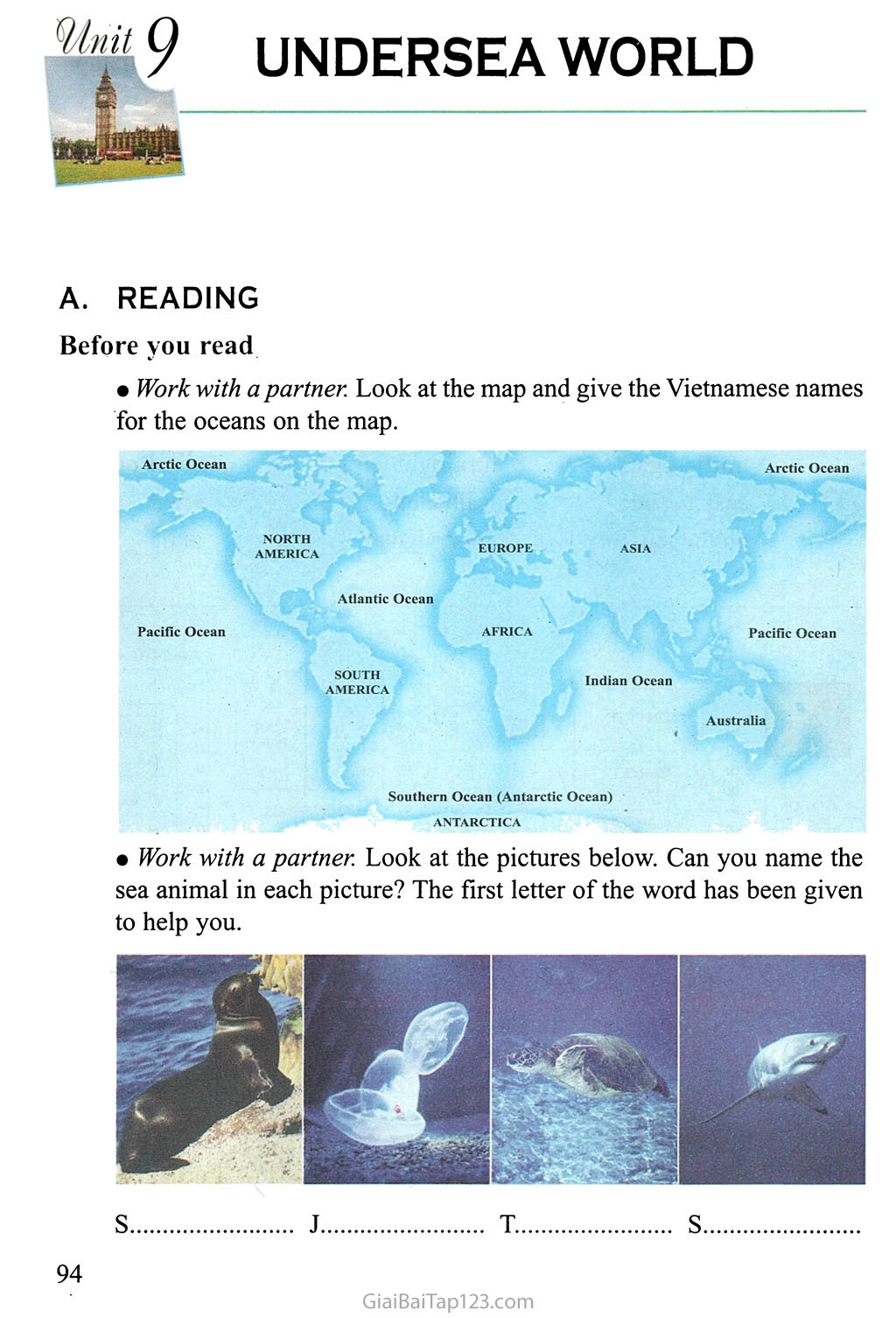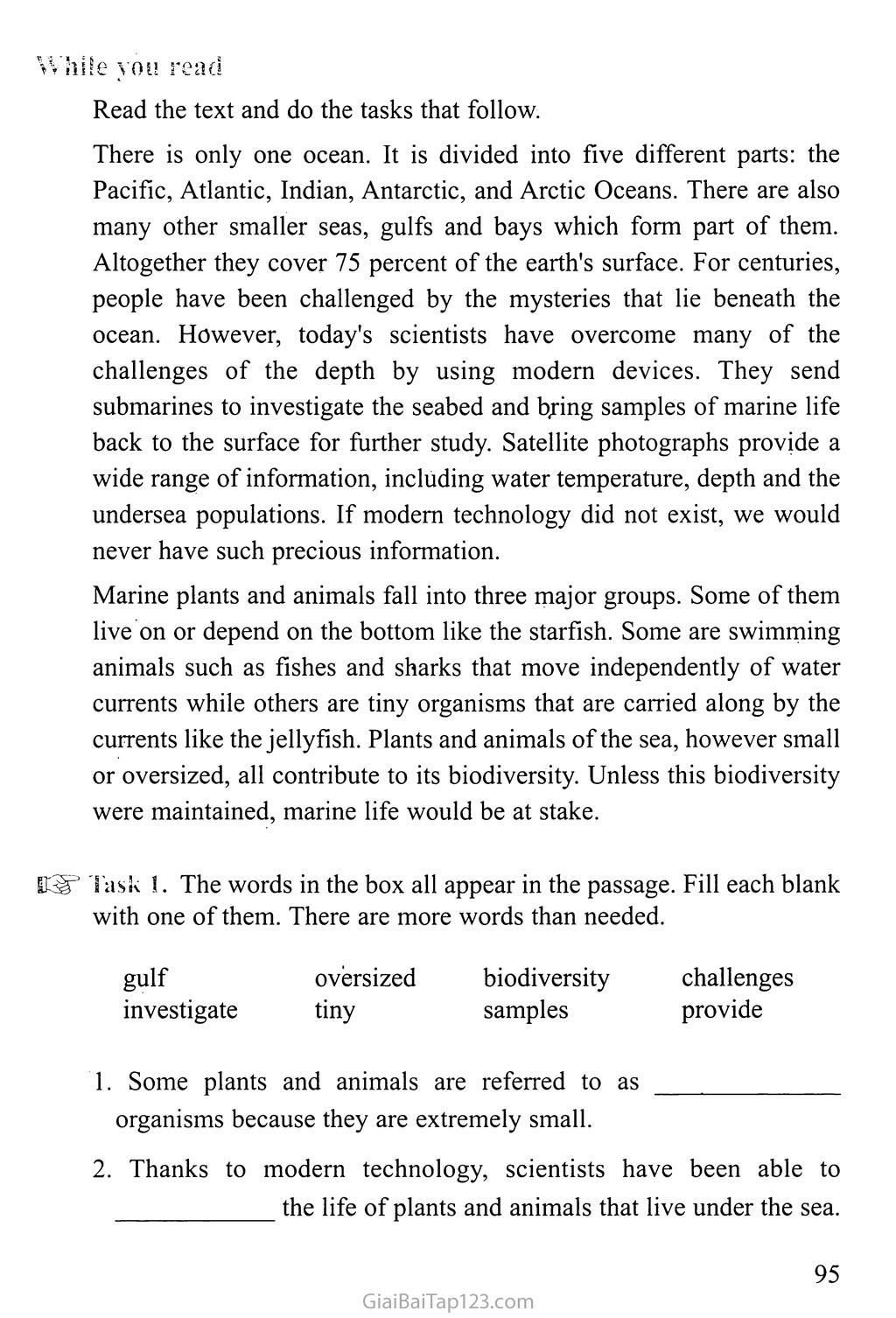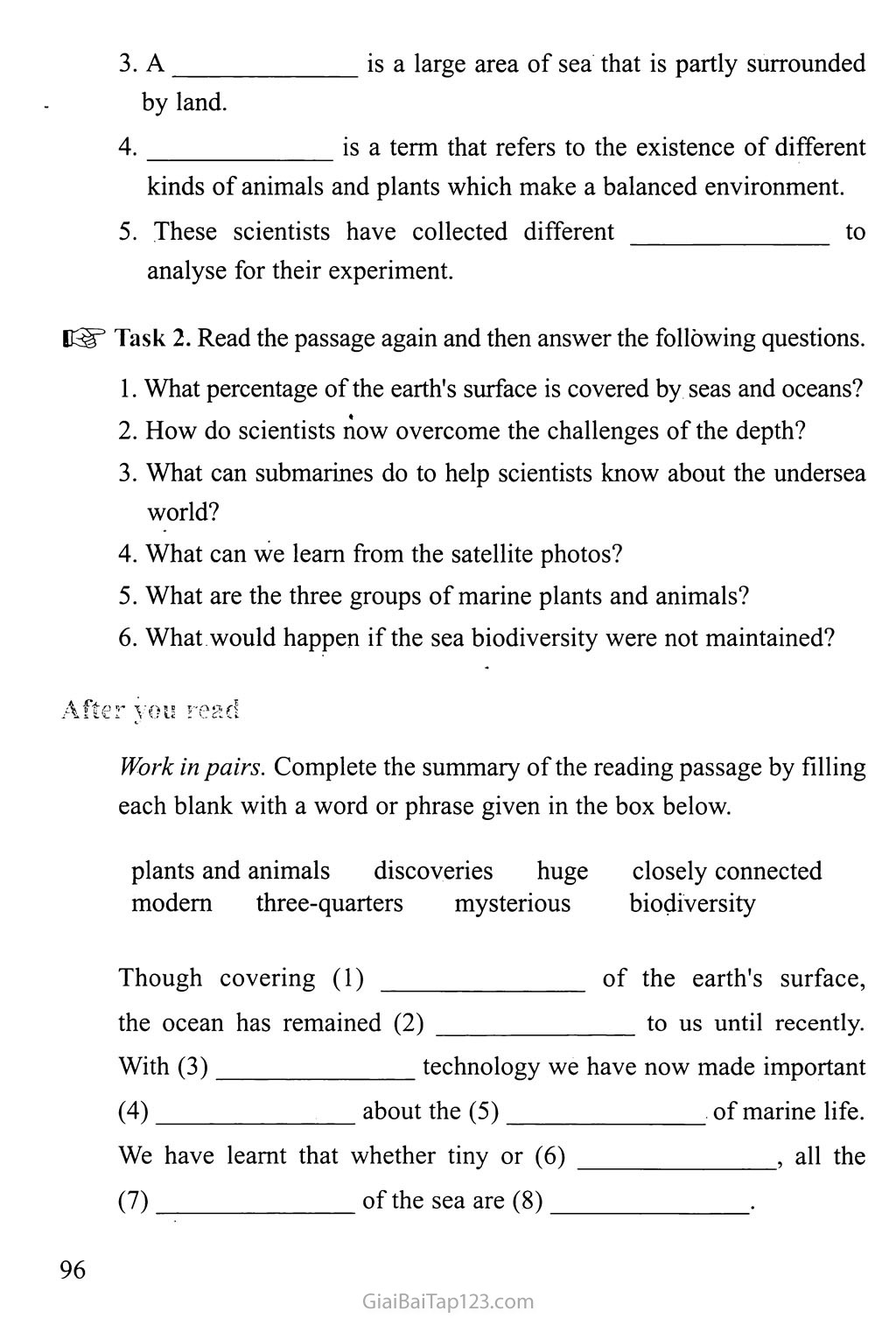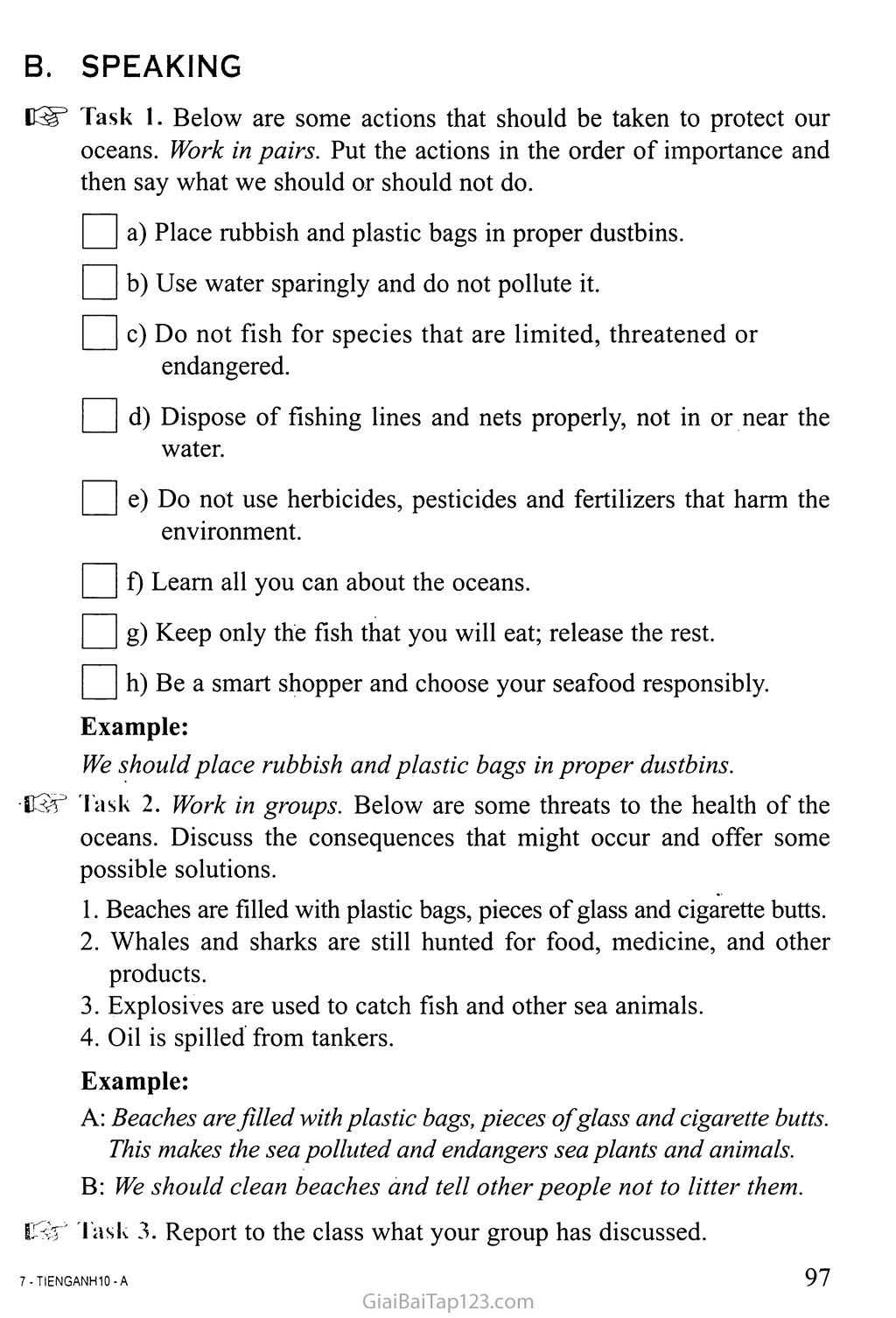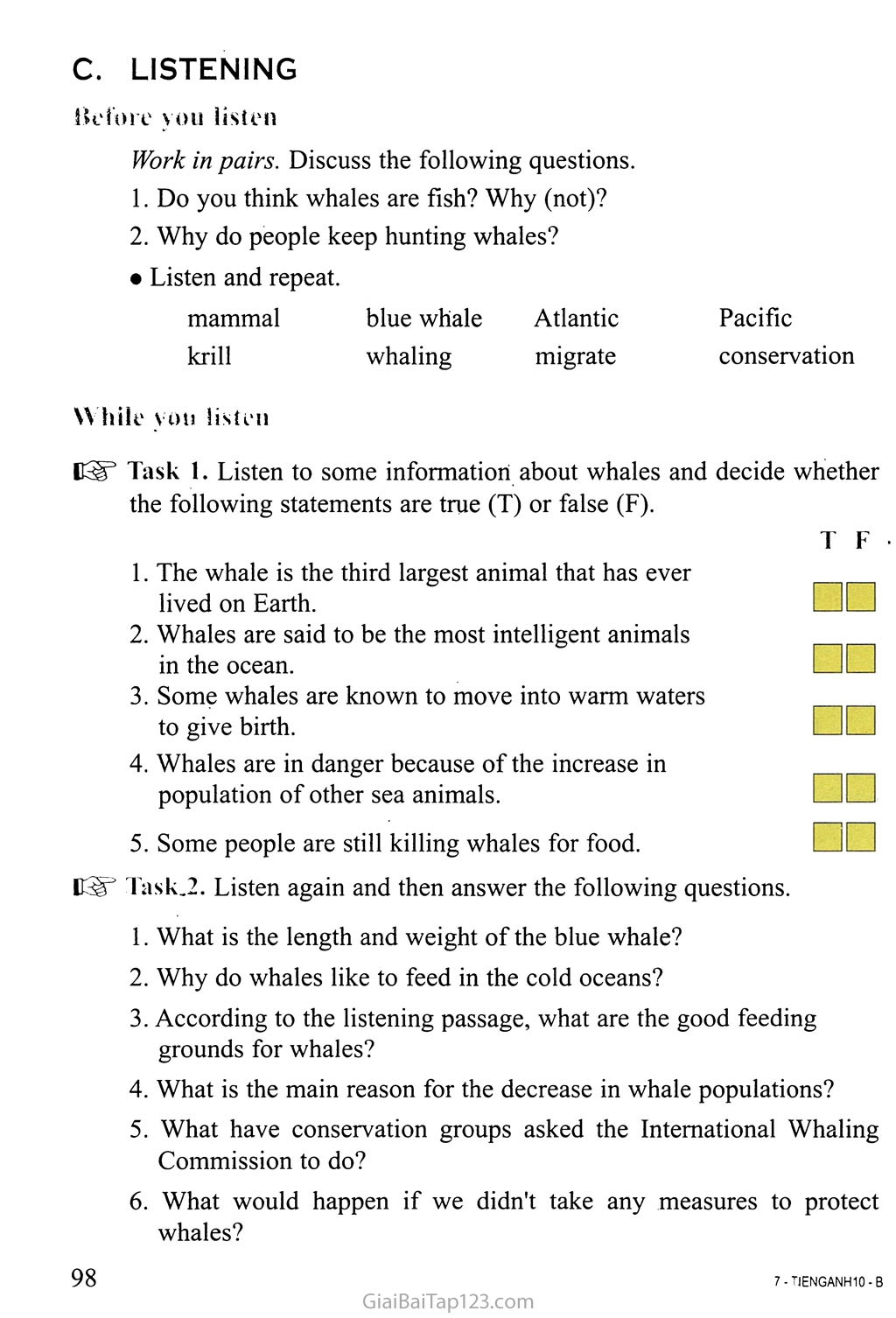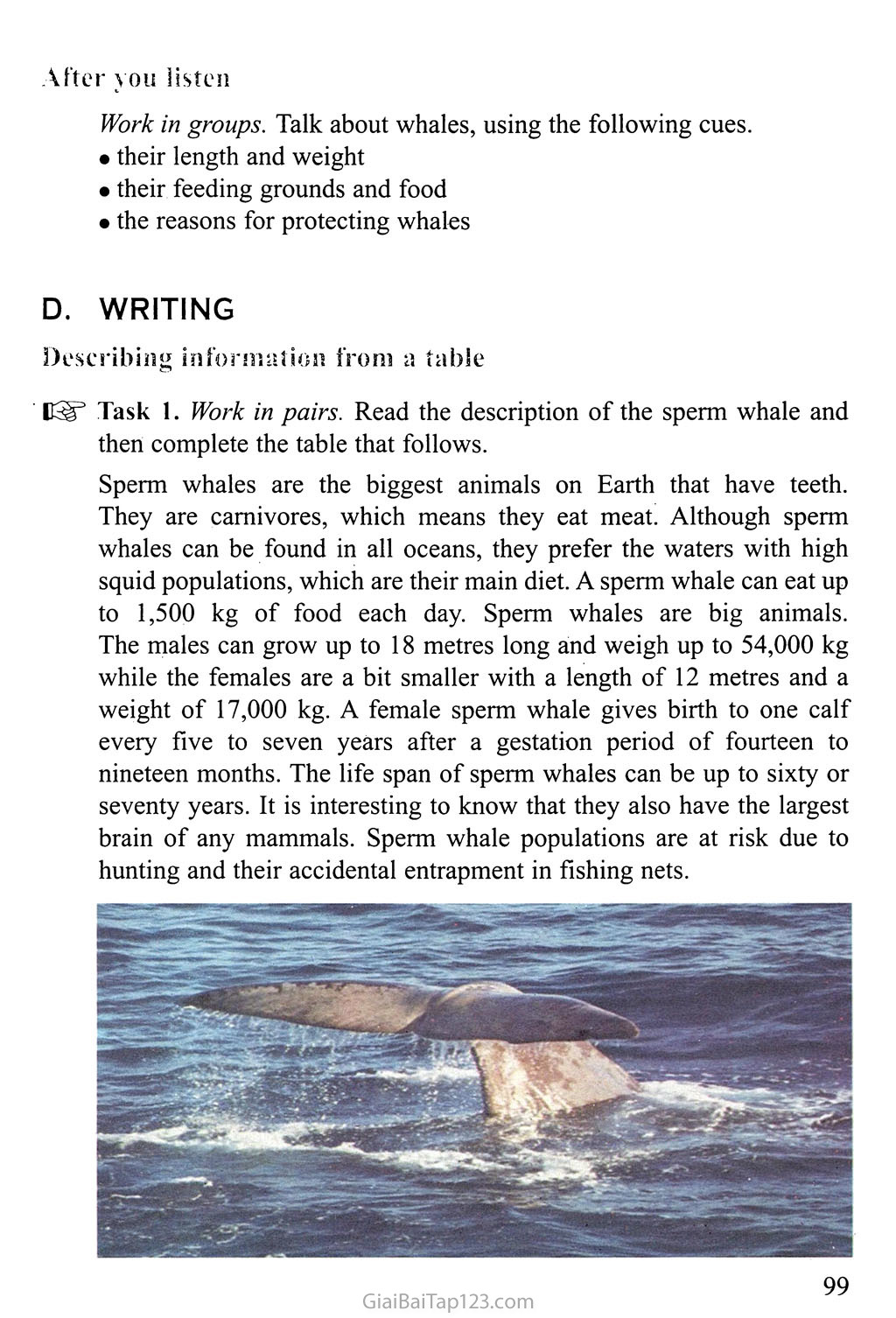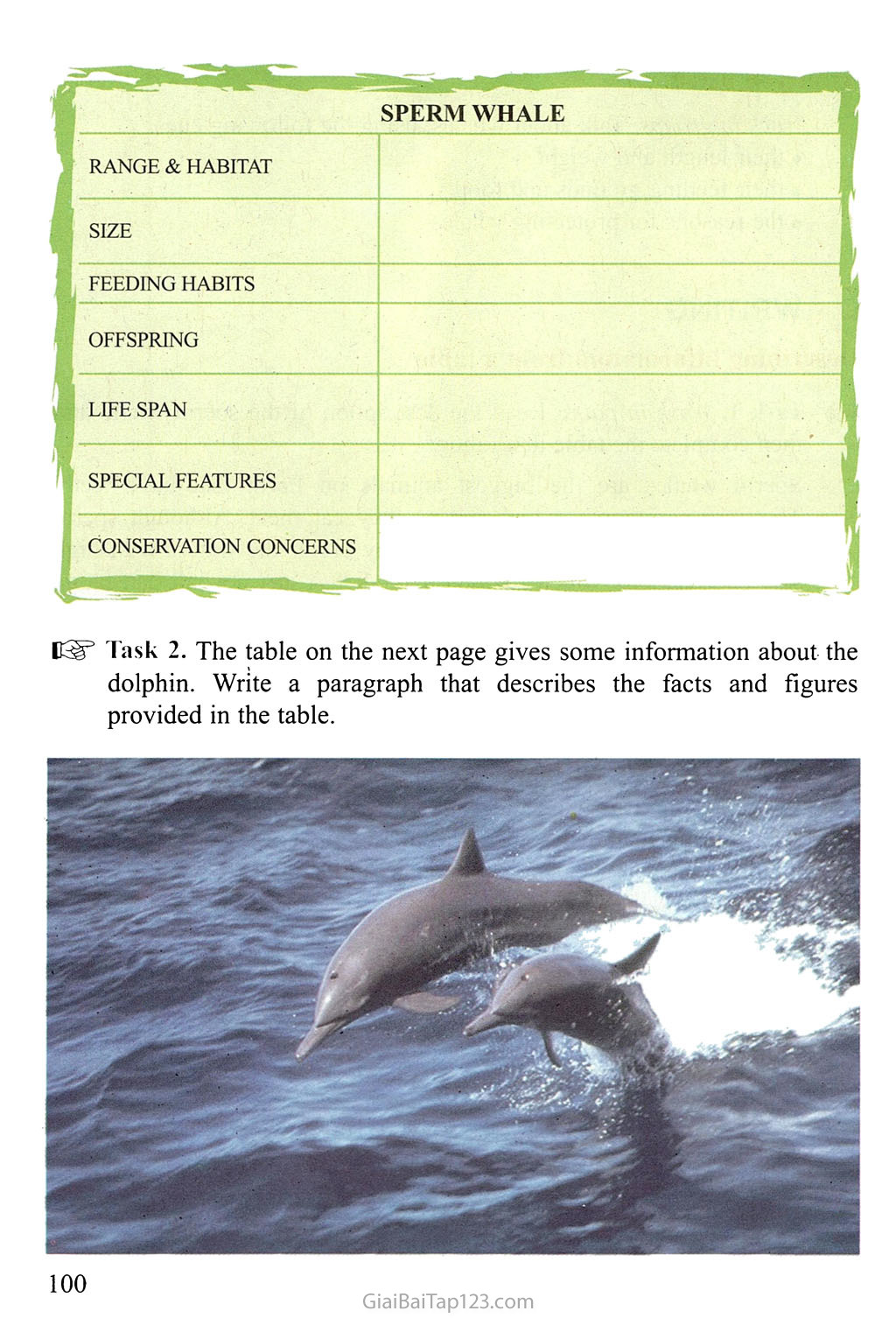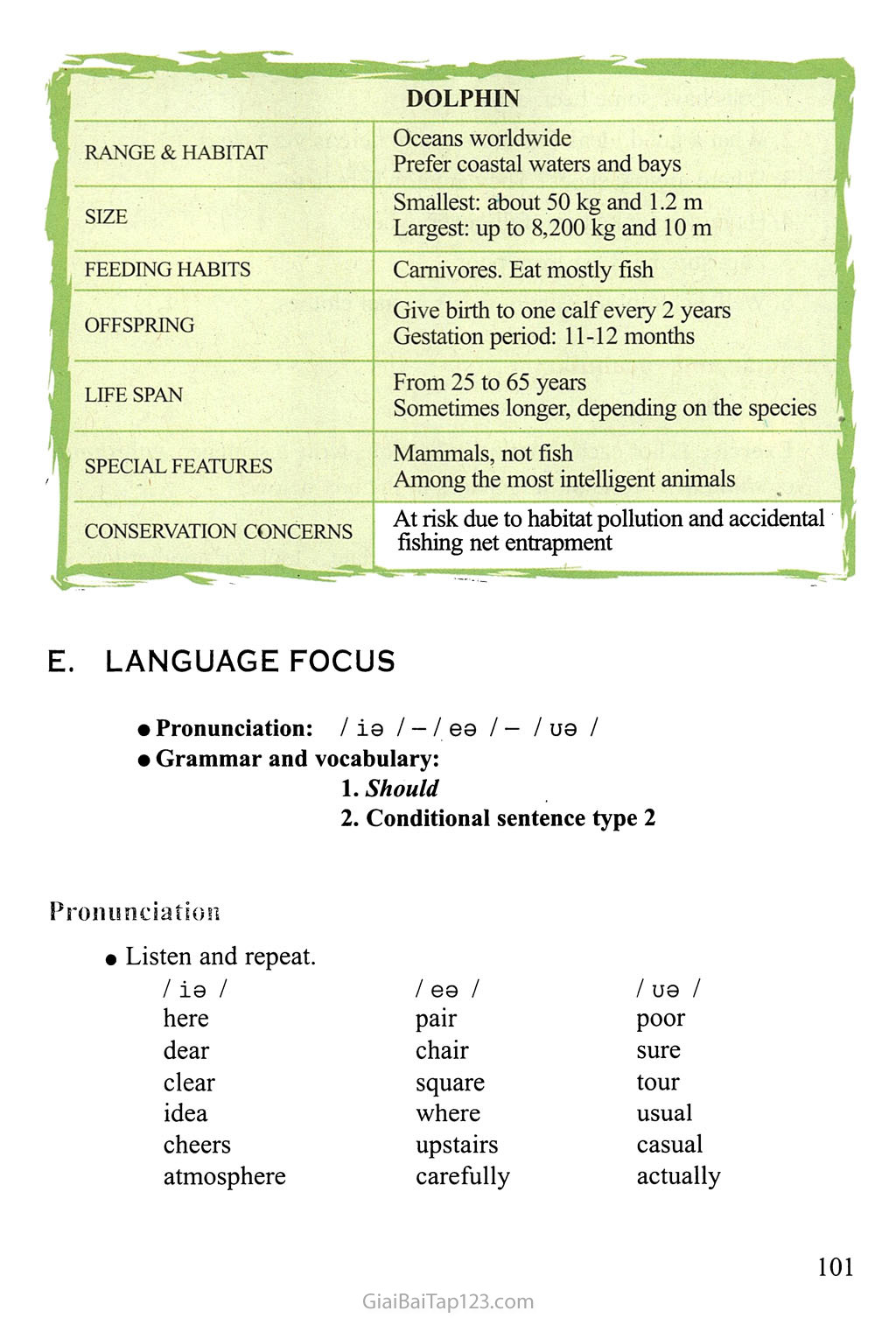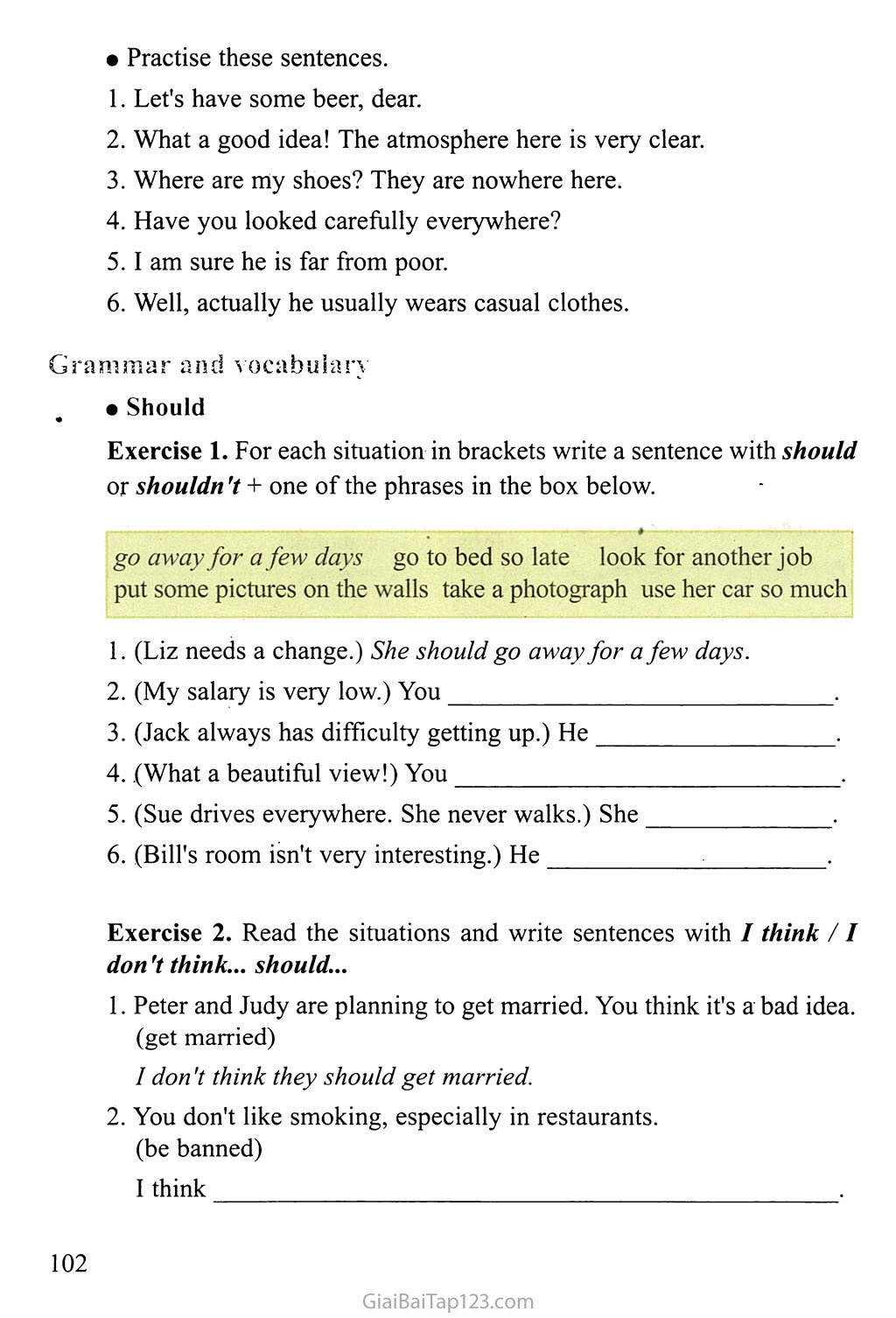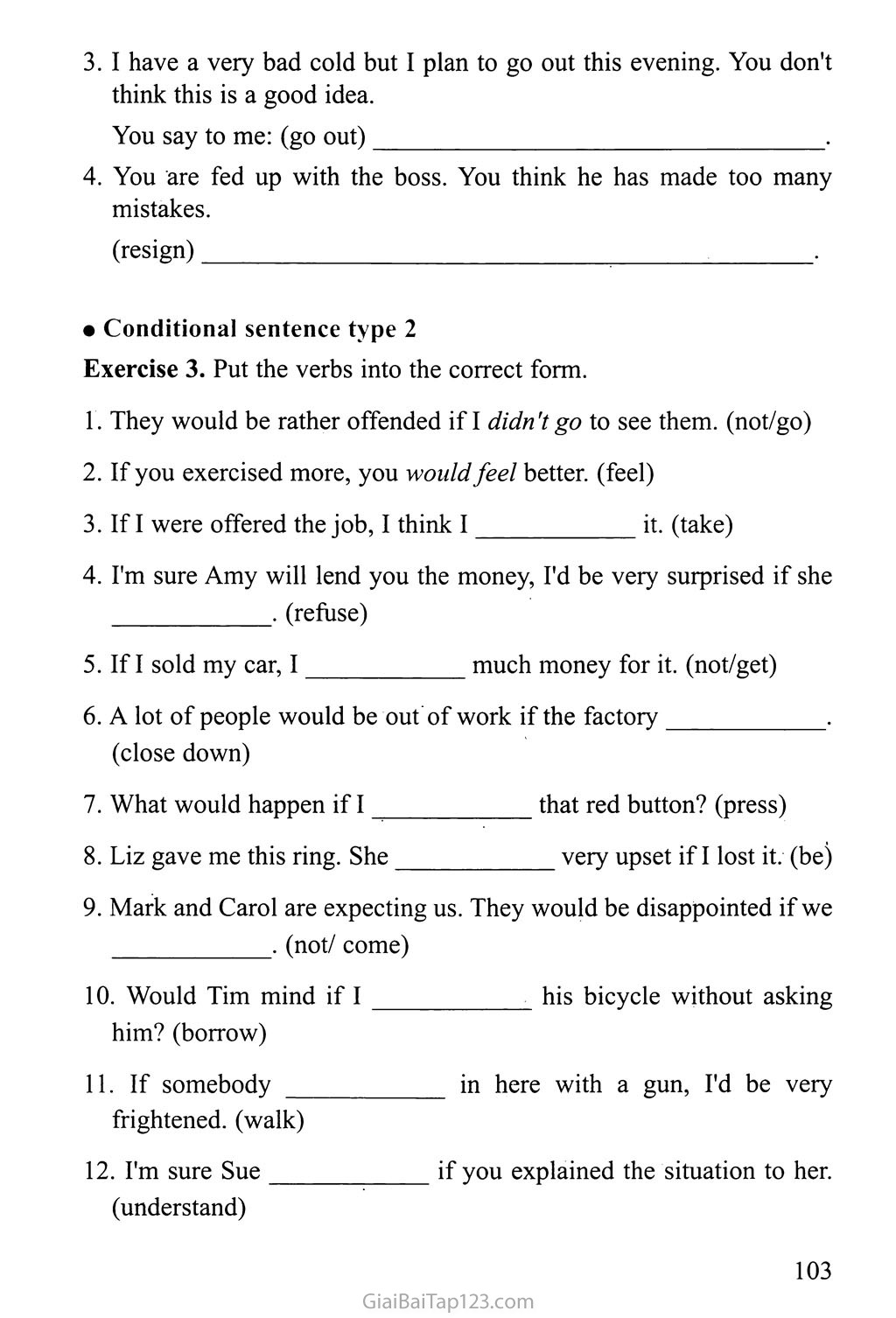SGK Tiếng Anh 10 - Unit 9: UNDERSEA WORLD
UNDERSEA WORLD A. READING Before you read • Work with a partner. Look at the map and give the Vietnamese names for the oceans on the map. Arctic Ocean NORTH AMERICA Atlantic Ocean Pacific Ocean SOUTH AMERICA Indian Ocean Pacific Ocean Australia Southern Ocean (Antarctic Ocean) ANTARCTICA • Work with a partner. Look at the pictures below. Can you name the sea animal in each picture? The first letter of the word has been given to help you. s J T s While you read Read the text and do the tasks that follow. There is only one ocean. It is divided into five different parts: the Pacific, Atlantic, Indian, Antarctic, and Arctic Oceans. There are also many other smaller seas, gulfs and bays which form part of them. Altogether they cover 75 percent of the earth's surface. For centuries, people have been challenged by the mysteries that lie beneath the ocean. However, today's scientists have overcome many of the challenges of the depth by using modern devices. They send submarines to investigate the seabed and bring samples of marine life back to the surface for further study. Satellite photographs provide a wide range of information, including water temperature, depth and the undersea populations. If modem technology did not exist, we would never have such precious information. Marine plants and animals fall into three major groups. Some of them live on or depend on the bottom like the starfish. Some are swimming animals such as fishes and sharks that move independently of water currents while others are tiny organisms that are carried along by the currents like the jellyfish. Plants and animals of the sea, however small or oversized, all contribute to its biodiversity. Unless this biodiversity were maintained, marine life would be at stake. EST Task 1. The words in the box all appear in the passage. Fill each blank with one of them. There are more words than needed. gulf oversized biodiversity challenges investigate tiny samples provide Some plants and animals are referred to as organisms because they are extremely small. Thanks to modern technology, scientists have been able to the life of plants and animals that live under the sea. . 3. A is a large area of sea that is partly surrounded by land. is a term that refers to the existence of different kinds of animals and plants which make a balanced environment. These scientists have collected different to analyse for their experiment. KUf Task 2. Read the passage again and then answer the following questions. What percentage of the earth's surface is covered by seas and oceans? How do scientists now overcome the challenges of the depth? What can submarines do to help scientists know about the undersea world? What can we learn from the satellite photos? What are the three groups of marine plants and animals? What would happen if the sea biodiversity were not maintained? After you read Work in pairs. Complete the summary of the reading passage by filling each blank with a word or phrase given in the box below. plants and animals discoveries huge closely connected modem three-quarters mysterious biodiversity Though covering (1) of the earth's surface, the ocean has remained (2) to us until recently. With (3) technology we have now made important (4) about the (5) of marine life. We have learnt that whether tiny or (6) , all the (7) of the sea are (8) . B. SPEAKING Eif Task 1. Below are some actions that should be taken to protect our oceans. Work in pairs. Put the actions in the order of importance and then say what we should or should not do. ] a) Place rubbish and plastic bags in proper dustbins. ] b) Use water sparingly and do not pollute it. ] c) Do not fish for species that are limited, threatened or endangered. ] d) Dispose of fishing lines and nets properly, not in or near the water. ] e) Do not use herbicides, pesticides and fertilizers that harm the environment. ] f) Learn all you can about the oceans. ^1 g) Keep only the fish that you will eat; release the rest. ] h) Be a smart shopper and choose your seafood responsibly. Example: We should place rubbish and plastic bags in proper dustbins. 'C3U Task 2. Work in groups. Below are some threats to the health of the oceans. Discuss the consequences that might occur and offer some possible solutions. Beaches are filled with plastic bags, pieces of glass and cigarette butts. Whales and sharks are still hunted for food, medicine, and other products. Explosives are used to catch fish and other sea animals. Oil is spilled from tankers. Example: A: Beaches are filled with plastic bags, pieces of glass and cigarette butts. This makes the sea polluted and endangers sea plants and animals. B: We should clean beaches and tell other people not to litter them. nW Task 3. Report to the class what your group has discussed. c. LISTENING Before you listen Work in pairs. Discuss the following questions. Do you think whales are fish? Why (not)? Why do people keep hunting whales? • Listen and repeat. mammal blue whale Atlantic Pacific krill whaling migrate conservation While you listen Task 1. Listen to some information about whales and decide whether the following statements are true (T) or false (F). T F The whale is the third largest animal that has ever Some people are still killing whales for food. F3C Task.2. Listen again and then answer the following questions. What is the length and weight of the blue whale? Why do whales like to feed in the cold oceans? According to the listening passage, what are the good feeding grounds for whales? What is the main reason for the decrease in whale populations? What have conservation groups asked the International Whaling Commission to do? What would happen if we didn't take any measures to protect whales? After you listen Work in groups. Talk about whales, using the following cues. their length and weight their feeding grounds and food the reasons for protecting whales D. WRITING Describing information from a table ' Task 1. Work in pairs. Read the description of the sperm whale and then complete the table that follows. Sperm whales are the biggest animals on Earth that have teeth. They are carnivores, which means they eat meat. Although sperm whales can be found in all oceans, they prefer the waters with high squid populations, which are their main diet. A sperm whale can eat up to 1,500 kg of food each day. Sperm whales are big animals. The males can grow up to 18 metres long and weigh up to 54,000 kg while the females are a bit smaller with a length of 12 metres and a weight of 17,000 kg. A female sperm whale gives birth to one calf every five to seven years after a gestation period of fourteen to nineteen months. The life span of sperm whales can be up to sixty or seventy years. It is interesting to know that they also have the largest brain of any mammals, sperm whale populations are at risk due to hunting and their accidental entrapment in fishing nets. SPERM WHALE RANGE & HABITAT • SIZE ' |! FEEDING HABITS OFFSPRING HS LIFE SPAN ft SPECIAL FEATURES CONSERVATION CONCERNS ^|_ - ; —1 ; " — . J KẫT Task 2. The table on the next page gives some information about the dolphin. Write a paragraph that describes the facts and figures provided in the table. DOLPHIN RANGE & HABITAT Oceans worldwide Prefer coastal waters and bays SIZE Smallest: about 50 kg and 1.2 m Largest: up to 8,200 kg and 10 m FEEDING HABITS Carnivores. Eat mostly fish OFFSPRING Give birth to one calf every 2 years Gestation period: 11-12 months LIFE SPAN From 25 to 65 years Sometimes longer, depending on the species SPECIAL FEATURES Mammals, not fish Among the most intelligent animals CONSERVATION CONCERNS At risk due to habitat pollution and accidental fishing net entrapment k : J E. LANGUAGE FOCUS Pronunciation: /is / - / e© / — / u© I Grammar and vocabulary: Should Conditional sentence type 2 Pronunciation • Listen and repeat. / i© / / e© / / u© / here pair poor dear chair sure clear square tour idea where usual cheers upstairs casual atmosphere carefully actually Practise these sentences. Let's have some beer, dear. What a good idea! The atmosphere here is very clear. Where are my shoes? They are nowhere here. Have you looked carefully everywhere? 5.1 am sure he is far from poor. Well, actually he usually wears casual clothes. Grammar and vocabulary Should Exercise 1. For each situation in brackets write a sentence with should or shouldn't + one of the phrases in the box below. “ — ♦ go away for a few days go to bed so late look for another job put some pictures on the walls take a photograph use her car so much (Liz needs a change.) She should go away for a few days. (My salary is very low.) You . (Jack always has difficulty getting up.) He . (What a beautiful view!) You . (Sue drives everywhere. She never walks.) She . (Bill's room isn't very interesting.) He . Exercise 2. Read the situations and write sentences with I think /1 don't think... should... Peter and Judy are planning to get married. You think it's a bad idea, (get married) I don't think they should get married. You don't like smoking, especially in restaurants. (be banned) I think I have a very bad cold but I plan to go out this evening. You don't think this is a good idea. You say to me: (go out) . You are fed up with the boss. You think he has made too many mistakes. (resign) T . • Conditional sentence type 2 Exercise 3. Put the verbs into the correct form. They would be rather offended if I didn't go to see them, (not/go) If you exercised more, you would feel better, (feel) If I were offered the job, I think I it. (take) I'm sure Amy will lend you the money, I'd be very surprised if she . (refuse) If I sold my car, I much money for it. (not/get) A lot of people would be out of work if the factory . (close down) What would happen if 1 that red button? (press) Liz gave me this ring. She very upset if I lost it. (be) Mark and Carol are expecting US. They would be disappointed if we . (not/ come) Would Tim mind if I his bicycle without asking him? (borrow) If somebody in here with a gun, I'd be very frightened, (walk) I'm sure Sue if you explained the situation to her. (understand)

